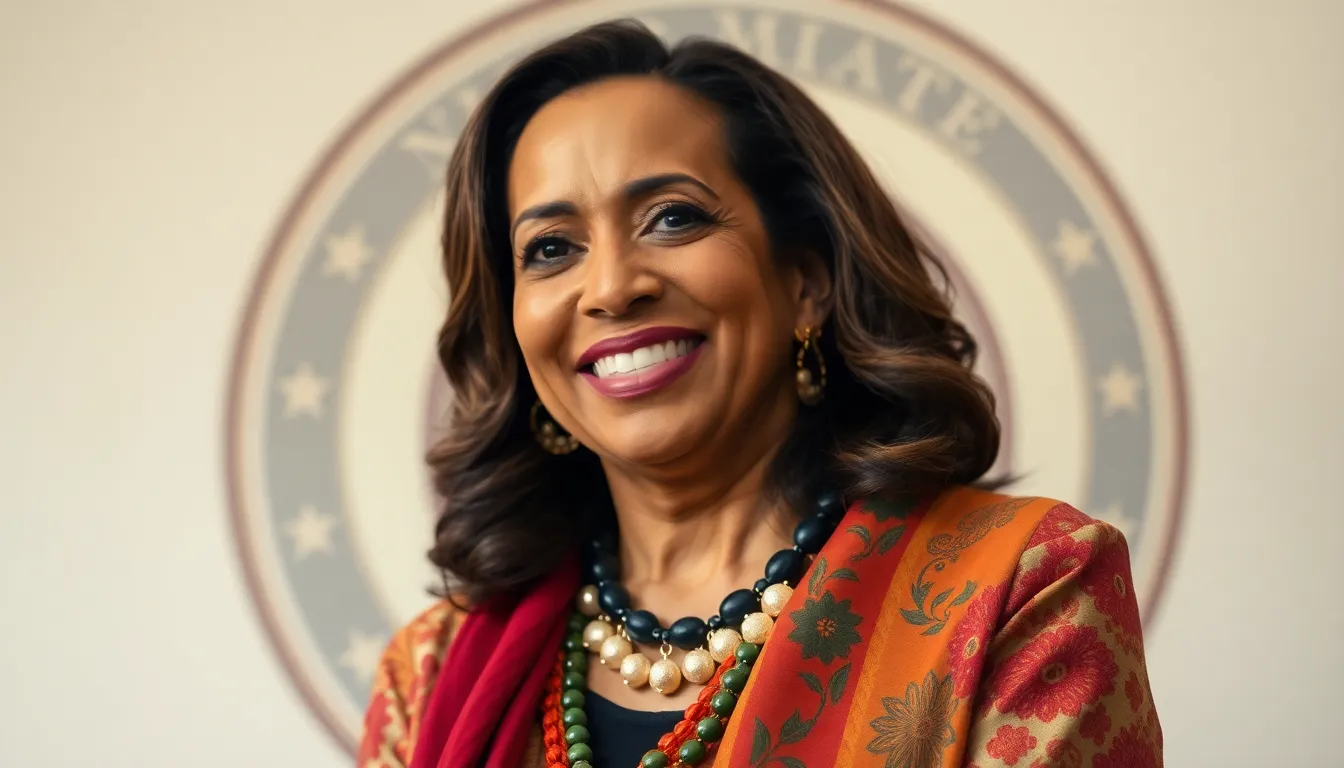Table of Contents
ToggleKamala Harris, the first female Vice President of the United States, has a heritage as rich and diverse as her political career. But what about the woman behind the woman? Her mother, Shyamala Gopalan Harris, is a fascinating figure whose ethnicity adds layers to Kamala’s identity. Born in India, Shyamala’s story is one of resilience and ambition, reflecting the melting pot that is America.
Overview of Kamala Harris’ Background
Kamala Harris, the first female Vice President of the United States, has a rich and diverse background shaped significantly by her mother, Shyamala Gopalan Harris. Shyamala, born in 1938 in India, immigrated to the U.S. to pursue her education and career in cancer research. Indian ancestry plays a crucial role in Kamala’s identity.
An influential figure in Kamala’s life, Shyamala instilled values of hard work and perseverance. She worked at the University of California, Berkeley, where she was recognized for her contributions to research and social justice. Shyamala’s experiences as a woman of color navigating a predominantly male field inspired Kamala to confront systemic challenges.
American society reflects a melting pot of cultures, and Kamala embodies this through her mixed heritage. Her father, Donald Harris, hails from Jamaica, adding to her diverse lineage. This combination of Indian and Jamaican roots informs her perspectives on race, gender, and identity.
Growing up, Kamala was exposed to a broad array of cultural influences. She celebrated traditional Indian festivals and embraced her Caribbean background. These experiences fostered a strong sense of community and fueled her commitment to social equity.
In public life, Kamala often acknowledges her mother’s influence. Shyamala’s journey from India to the United States serves as a testament to resilience and ambition, characteristics that Kamala highlights in her own narrative. Such an intersection of cultures represents a broader story of the American experience.
Kamala Harris’ Mother’s Ethnicity


Kamala Harris’ mother, Shyamala Gopalan Harris, has Indian ethnicity, which significantly shapes Kamala’s identity. Shyamala emigrated from India in 1938, bringing her rich heritage and cultural values to the United States.
Indian Heritage
Indian heritage plays a crucial role in Kamala’s life. Shyamala revered her Tamil roots and frequently shared the traditions and customs of her homeland with Kamala and her sister. Education held immense value in their household, aligning with Shyamala’s dedication to her career in cancer research. Resilience and determination were central themes in Shyamala’s narrative. As a woman of color in a male-dominated field, Shyamala’s accomplishments inspired Kamala to pursue her goals fearlessly.
Jamaican Connections
Jamaican connections through Kamala’s father, Donald Harris, enrich her diverse identity. Donald, born in Jamaica, ensured that Kamala also had exposure to Caribbean culture. Caribbean traditions, meals, and values complemented the Indian influences in her home. Celebrating both cultures provided Kamala with a broad perspective on life. The blend of these backgrounds fosters her commitment to social equity and diverse representation in her public life.
Impact of Ethnicity on Kamala Harris
Kamala Harris’ ethnic background plays a crucial role in shaping her identity and public persona. Both her Indian and Jamaican heritages contribute to her multifaceted understanding of culture and community.
Cultural Influences
Cultural influences from her mother’s Indian roots significantly impact Kamala’s values. Shyamala Gopalan Harris emphasized education and tradition, fostering a deep appreciation for her Tamil heritage. Celebrating Indian festivals like Diwali, Kamala learned the importance of cultural continuity. Caribbean traditions from her father’s Jamaican side also enriched her upbringing. Regularly experiencing a blend of cultures, she developed a broader perspective on social issues. This diversity informs her approach to governance and public service.
Personal Identity
Personal identity for Kamala reflects a synthesis of her cultural backgrounds. Experiences growing up in diverse environments cultivated resilience and ambition in her character. Embracing her dual heritage fosters a commitment to equity and justice. Directly influenced by her mother, she often highlights the significance of overcoming obstacles. Kamala’s identity resonates deeply with many Americans, showcasing the power of diversity. In public discourse, she frequently draws on her background, linking her journey to those facing systemic challenges.
Public Perception and Representation
Public perception of Kamala Harris often reflects her diverse heritage, rooted in her mother Shyamala Gopalan Harris’ Indian background. Her mother’s journey as an immigrant who excelled in cancer research resonates with many individuals. Shyamala’s commitment to education and perseverance shapes how Kamala embodies these values publicly.
Representation matters greatly in this context. Many view Kamala as a symbol of multicultural identity, bridging gaps between various cultural narratives. Her story epitomizes the American immigrant experience, appealing to diverse communities across the nation.
Cultural influences from her Indian roots play a significant role in shaping her policies and perspectives. Kamala frequently emphasizes the importance of education, a value her mother instilled in her. Embracing her Jamaican heritage adds another layer to her identity. This multifaceted representation allows her to connect with a wide range of constituents.
The impact of Kamala’s background extends to her role as a public figure. She consistently advocates for social equity, drawing from her personal experiences. Many Americans find her resilience inspiring as she tackles systemic challenges.
Moreover, representation within leadership holds considerable weight in society. Kamala’s visibility as a woman of color in such a prominent position encourages discussions about diversity and inclusion. She exemplifies the potential for individuals from varied backgrounds to influence policy and foster change, enhancing public dialogue around race and identity.
As a result, the narrative surrounding Kamala Harris reflects broader conversations about representation and its importance in shaping societal values.







